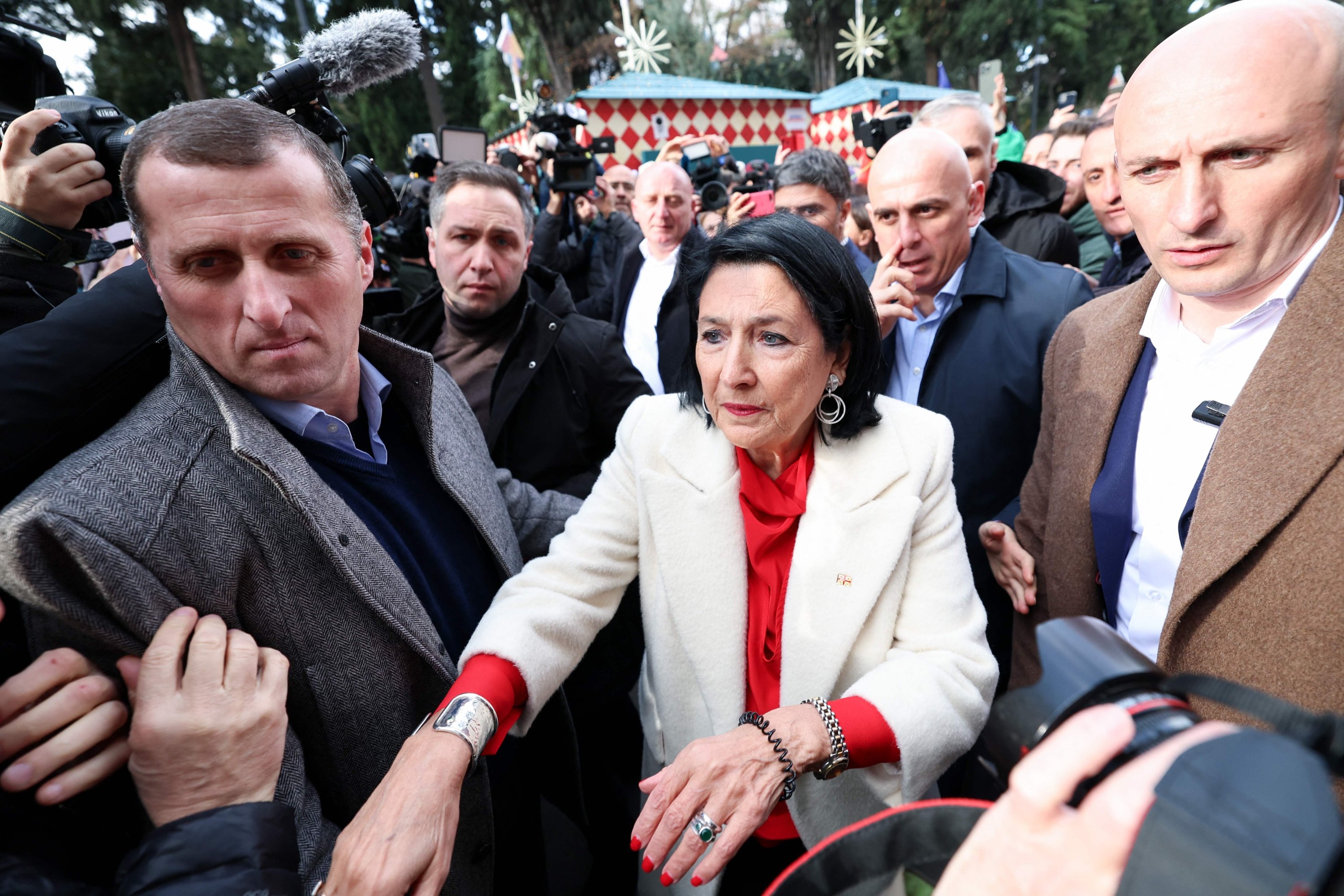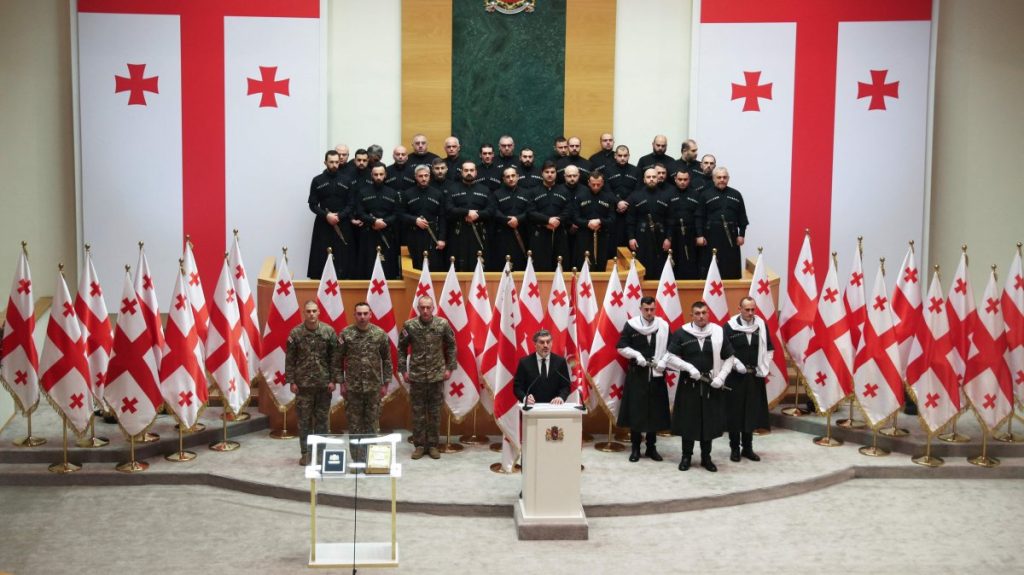Georgia has recently emerged as the country in the South Caucasus where Western concerns are most visible. Under normal circumstances, after a peaceful election process, one would expect a handover ceremony and the new president to take office. However, the situation following the elections in Georgia has unfolded contrary to these general expectations. On Dec. 29, 2024, the presidential handover was expected to take place. However, former President Salome Zourabichvili declared that the elections were fraudulent, that she did not accept the results and therefore did not recognize Mikhail Kavelashvili, elected by the 300-member electoral college resulting from these elections, as the legitimate president. She stated that her presidency would continue regardless.
Later, Zourabichvili retracted her statement, saying she would leave the presidential residence but that this did not mean she was giving up her presidency. Ultimately, Kavelashvili was able to take the office. Thus, Zourabichvili’s resistance proved ineffective. Consequently, Georgia has begun anew with a new president and administration.
Leaders against each other
Georgia is a strategic country where the West and Russia vie for influence. During the latest election process, this competition has become the most visible.
Former President Zourabichvili is a politician equipped with Western culture. Born in 1952 in Paris, Zourabichvili grew up in France and graduated from the Paris Institute of Political Studies. She later completed a master’s degree in international relations at Columbia University in the United States. Her diplomatic career began at the French Ministry of Foreign Affairs, where she served in various countries, including as France’s Ambassador to Georgia from 2001 to 2003. Zourabichvili acquired Georgian citizenship in 2004 and was appointed foreign minister that same year. However, she resigned in 2005 due to disagreements with President Mikheil Saakashvili. In 2018, she ran as an independent candidate for the presidency of Georgia and became the country’s first female president with 59% of the vote. Throughout her term, she pursued a policy supportive of Georgia’s integration with the West.
Zourabishvili followed pro-Western and pro-EU policies but had occasional tensions with the ruling Georgian Dream Party (GD). She argued that the current government did not adhere to democratic standards, which led to increased political tension at the end of her term. Salome Zourabichvili, besides being a significant figure in Georgia’s democratic transition process, is also notable for her experience in international relations and connections with the West.

On the other hand, the newly elected president, Kavelashvili, is a former football player. He played for the Georgian National Football Team from 1992 to 2002 and also for Manchester City. Kavelashvili entered Parliament as a member of the GD in 2016.
In 2022, he left the GD to become one of the founders of the People’s Power political movement, known for its more right-wing and anti-Western rhetoric compared to the GD. Kavelashvili was elected the president of Georgia in late 2024 as the candidate of the ruling GD. The election was conducted by a 300-member electoral college in parliament rather than by direct public vote. During the process, the opposition claimed the election was rigged and did not recognize the results, making Kavelashvili’s election controversial.
There are predictions that Kavelashvili will pursue a pro-Russia or at least less integrated policy with the West, which the opposition argues will negatively impact Georgia’s European Union (EU) and NATO integration process. However, in an interview after his election, Kavelashvili broke the mold by expressing his country’s desire to join the EU, emphasizing that this process should respect national values. He also commented on the ongoing protests in response to Prime Minister Irakli Kobakhidze’s decision in November 2024 to suspend EU accession negotiations for four years, stating he found Kobakhidze’s decision appropriate but clarified that Georgia’s EU integration process was not halted and should proceed with mutual respect. Kavelashvili accused the EU of applying double standards toward Tbilisi but reiterated Georgia’s desire to become an EU member. Kavelashvili’s stance could be seen as an attempt to soften criticisms of his anti-EU stance.
Moreover, despite all the controversies, Kavelashvili is known as a supporter of the “foreign agents” law that has come into effect, raising concerns about potential pressures on freedom of speech and civil society.
Despite Kavelashvili’s somewhat softened approach toward the EU, the U.S. and EU continue with sanction initiatives. It can be clearly stated that Georgia’s credibility in the West has diminished with the election of Kavelashvili, described as pro-Russian.
Western concerns
Zourabichvili did everything in her power to mobilize the West, with sanctions against Georgia at the forefront. Examples include meetings organized by EU foreign ministers. Both the EU and Zourabichvili were disappointed in the application of sanctions to Georgia as Hungary and Slovakia vetoed the sanction requests.
On Dec. 24, 2024, the U.S. Department of State declared Bidzina Ivanishvili, the founder and honorary chair of the GD, guilty of undermining Georgia’s democratic and Euro-Atlantic future in favor of Russian interests. The actions of Ivanishvili and his party have weakened democratic institutions in Georgia, led to human rights violations and restricted fundamental freedoms. The statement highlighted that Ivanishvili has left Georgia vulnerable to Russian occupation and has thwarted the Georgian people’s desire for a Euro-Atlantic future. The statement also strongly condemns the ongoing and violent repression of the protests under the GD leadership of Ivanishvili, including those directed at Georgian citizens, protesters, journalists, human rights activists and opposition figures. Ivanishvili was held accountable under Executive Order 14024 for actions that undermined democratic processes and institutions on behalf of or for the benefit of the Government of the Russian Federation.
Particularly, France has taken a clear stance against Georgia. France’s focus on this issue is directly proportional to its desire for a strong presence in the South Caucasus. To elaborate on the “South Caucasus,” it’s not wrong to say that France wants to have a say in both Georgia and Armenia. Until the date of the elections, France could maintain an effective presence in Georgia thanks to former President Zourabichvili. What makes Georgia important for France is that it serves as the only transit route to Armenia, therefore holding logistical and strategic significance. Armenia’s thoughts align similarly, hence Armenia continues to insist on opening borders with Türkiye. If borders were to open, there could be a possibility of using the route through Türkiye instead of Georgia. However, it is also worth remembering France’s weapon aid to Armenia and the assistance provided in smuggling ASALA terrorists from France and the U.S. to Armenia.
Regionally assessed, political tensions within Georgia affect neighboring countries. The EU’s presence in the region, Russia’s refusal to relinquish influence and the protests in Georgia seem likely to continue for some time.


